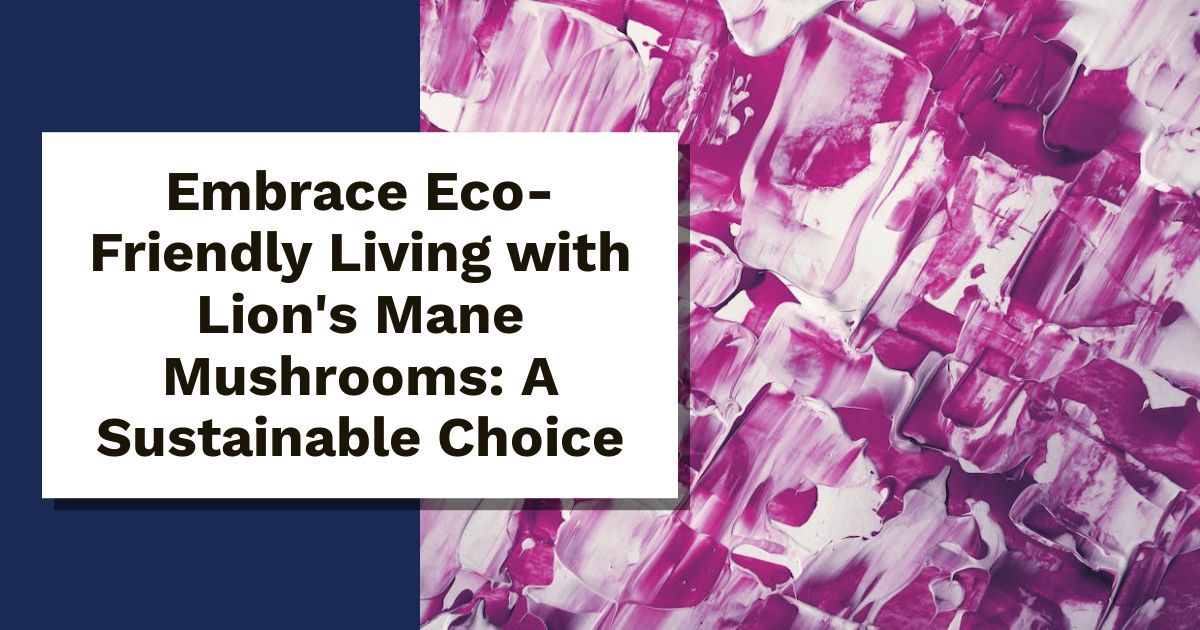Are you curious about how Lion’s Mane mushrooms can fit into a more eco-friendly lifestyle? These unique fungi not only offer health benefits but also align with sustainable living practices.
In this post, you’ll discover how incorporating Lion’s Mane can enhance your well-being while supporting the planet. From promoting brain health to being an easy addition to meals, these mushrooms are a win-win.
Get ready to find out why Lion’s Mane isn’t just a dietary choice but a step towards conscious living. Together, let’s explore this delightful and sustainable companion on your eco-friendly journey.
What is Lion’s Mane?
Lion’s Mane mushrooms (Hericium erinaceus) are not just a tasty treat; they’re a fascinating part of the fungi family. With their unique appearance and impressive health benefits, these mushrooms can play a significant role in an eco-friendly lifestyle. Let’s explore what makes Lion’s Mane so special.
Physical Characteristics
Lion’s Mane mushrooms are easily recognizable. They sport a striking, shaggy appearance that resembles a lion’s flowing mane. The color is typically a creamy white, and the texture feels soft and fuzzy. They grow in clusters, with spines that dangle like tiny icicles. This unusual look not only makes them stand out but also hints at their distinct qualities.
When you encounter Lion’s Mane, you’ll notice how they are unlike typical button mushrooms. Their irregular, rounded shape and spiky surface invite curiosity. Did you know that they can grow quite large, sometimes reaching up to a foot wide? Nature’s artistry is on full display with these mushrooms! For more on their physical traits, check out this detailed guide on Lion’s Mane characteristics.
Nutritional Profile
Lion’s Mane mushrooms are not just pretty faces; they are packed with nutrients! Here’s a quick look at their nutritional benefits:
- Low in Calories: About 35 calories per 100 grams.
- Rich in Nutrients: Includes fiber, protein, and essential minerals like potassium and iron.
- Contains Antioxidants: These compounds help fight oxidative stress in the body.
In terms of their specific nutritional contents, Lion’s Mane typically contains:
- Carbohydrates: Approximately 7 g
- Fiber: Around 4.4 g
- Protein: About 2.5 g
They are also known to contain bioactive compounds, such as beta-glucans, which may support immune health. For those seeking to enhance their diets with nutritious options, Lion’s Mane offers an appealing choice. Discover more about their health benefits in this comprehensive overview of Lion’s Mane nutrition.
Incorporating Lion’s Mane into your meals not only supports your health but also aligns with a sustainable and eco-friendly lifestyle.
Why Choose Eco-Friendly Living?
Choosing an eco-friendly lifestyle is about more than just saving the planet; it’s a chance to reflect on daily habits and make impactful changes. Every choice you make, from the products you buy to the way you dispose of waste, affects the environment. You might wonder, “How can my small actions create a difference?” Well, it turns out that even the simplest choices can help reduce pollution, conserve resources, and promote healthier living spaces. Let’s explore this further.
Environmental Impact
Everyday decisions play a significant role in shaping our planet’s future. When we opt for eco-friendly products and practices, we send a strong message about sustainability. For instance:
- Single-Use Plastics: Choosing reusable bags and containers can cut down waste significantly. Did you know that it can take hundreds of years for these plastics to decompose?
- Energy Efficiency: Using energy-efficient appliances reduces energy consumption and lowers carbon emissions. Think of it as giving Mother Earth a much-needed hug!
- Sustainable Sourcing: Supporting brands that use sustainable materials means you are backing systems that protect ecosystems. This promotes biodiversity and helps maintain healthy communities.
Making these small changes collectively leads to a substantial environmental impact. Consider this: if every American switched to LED light bulbs, we could save enough energy to light three million homes for a year! Explore more about how individual choices shape our environment in this guide on eco-friendly living.
Health Benefits of Eco-Friendly Living
Living sustainably is not just good for the Earth; it’s also a boost for your personal health. Embracing eco-friendly choices can lead to profound improvements in well-being. Here are a few benefits you might experience:
- Improved Indoor Air Quality: Using non-toxic cleaning products and natural materials can significantly enhance air quality. Breathe easier knowing you’re avoiding harmful chemicals.
- Healthier Food Choices: Eating locally sourced and organic foods can reduce exposure to pesticides and promote a balanced diet. Fresh, unprocessed food is often richer in nutrients.
- Enhanced Mental Well-Being: Spending time in green spaces and nature helps reduce stress and anxiety. It’s nature’s way of saying, “Take a chill pill!”
By prioritizing an eco-friendly lifestyle, you’re not just helping the planet; you’re also investing in your health. For a deeper dive into the health advantages of sustainable living, check out this article on the health benefits of sustainable living.
When you think about it, choosing eco-friendly living is a win-win! You can contribute positively to the environment while enjoying a healthier life. Isn’t it time we all started making choices that benefit both us and our planet?
Lion’s Mane in Eco-Friendly Practices
Lion’s Mane mushrooms can play a vital role in eco-friendly living, serving as both a delicious food option and a sustainable practice. Whether you’re growing your own, sourcing ethically, or incorporating them into your meals, there are many ways to embrace this fantastic fungus while minimizing your environmental footprint.
Growing Your Own Lion’s Mane
Cultivating Lion’s Mane at home is both rewarding and easy. You don’t need a green thumb to get started! Here are some handy tips for successful home cultivation:
- Choose the Right Substrate: Lion’s Mane thrives on hardwood logs or sawdust blocks. This mimics their natural habitat, allowing for optimal growth.
- Maintain Optimal Conditions: Keep the growth area cool and humid. A temperature range of 70°F to 75°F works wonders. Consider misting the environment multiple times a day to keep moisture levels up.
- Lighting Matters: Use indirect sunlight or LED grow lights for about 12 hours a day. Light can trigger fruiting and enhance growth.
- Patience is Key: It may take a little time, but with the right care, you can harvest your Lion’s Mane mushrooms in a few months!
For an in-depth guide on cultivating Lion’s Mane, check out this ultimate guide.
Sustainable Sourcing
Finding ethically sourced Lion’s Mane mushrooms is crucial for maintaining environmental standards. Here’s how to ensure you’re making the right choices:
- Forage Responsibly: If you choose foraging, research the areas where Lion’s Mane mushrooms grow naturally. They often prefer cooler regions and can be found on decaying wood. Ensure to pick sustainably to protect local ecosystems. For tips on foraging, read this insightful article.
- Support Local Farmers: Buying directly from local sources means your mushrooms are fresher! Look for farmers who practice sustainable methods.
- Check Product Labels: Whether buying dried mushrooms or supplements, check for certifications that ensure sustainable and ethical sourcing. Brands like Root & Earth provide wild-harvested Lion’s Mane that honors nature.
Using Lion’s Mane in Recipes
Incorporating Lion’s Mane into your meals is a delicious way to benefit from its health properties. Here are a couple of eco-friendly recipes to try out:
- Sautéed Lion’s Mane Mushrooms: Slice Lion’s Mane into thick pieces. Heat olive oil or butter in a skillet, add the slices, and cook until golden brown. This simple dish pairs well with grains or as a side.
- Lion’s Mane Mushroom Steaks: For a meat-like texture, try searing Lion’s Mane mushrooms with balsamic glaze. The result? A savory dish that delights the palate! Check out this delicious recipe for full instructions.
These easy recipes highlight Lion’s Mane’s unique texture and flavor, making them perfect for an eco-friendly meal. For more inspiring ideas, explore this round-up of Lion’s Mane recipes.
By growing, sourcing, and cooking with Lion’s Mane sustainably, you’re not just enhancing your meals—you’re also making conscientious choices for our planet. So roll up your sleeves, get cooking, and enjoy the many benefits of this remarkable mushroom!
The Community and Sustainability
Building a supportive community around Lion’s Mane mushrooms creates opportunities for sustainable living. Engaging with others not only enhances personal knowledge but also fosters a culture of conservation and responsibility.
Local Foraging Groups
One of the best ways to learn about Lion’s Mane and its impact on the environment is through local foraging groups. These communities are perfect for discovering the art of sustainable foraging. Joining such groups can enrich your understanding of natural ecosystems and the importance of responsible harvesting.
Foraging clubs often host workshops and guided walks, allowing members to learn about edible wild foods, including Lion’s Mane. In addition, these clubs promote sustainable practices that protect local habitats. Consider looking into resources like Foraging for Sustainable Futures to connect with others passionate about responsible foraging.
Imagine walking through a serene forest, learning how to identify Lion’s Mane while chatting with fellow nature enthusiasts. Isn’t that a great way to spend a weekend? When you engage with a community of like-minded individuals, you gain insights that books alone can’t provide.
Sharing Knowledge
Community workshops focused on Lion’s Mane mushrooms are a fun and effective way to share knowledge and promote sustainable practices. These hands-on events allow participants to learn how to grow, harvest, and cook with Lion’s Mane.
Many organizations and local groups offer workshops that cater to all levels of expertise. For instance, check out the Lion’s Mane Cultivation Workshop for beginners eager to get started. Attending such events allows you to meet mushroom enthusiasts and local experts who can share valuable tips.
These workshops can create a ripple effect in your community. When you learn together, you inspire others to embrace eco-friendly practices. Plus, who doesn’t love sharing delicious recipes? Consider hosting a potluck where everyone brings a dish featuring Lion’s Mane. It’s a delightful way to taste the fruits of your learning!
Engaging with your community about Lion’s Mane mushrooms offers an array of opportunities to uplift sustainable living. So whether you’re foraging, attending workshops, or sharing recipes, remember that each action contributes to a more eco-conscious world. Embrace the spirit of community and sustainability together!
Personal Stories and Experiences
Exploring Lion’s Mane mushrooms goes beyond their health benefits. Personal stories reveal how they transform lives and contribute to eco-friendly practices. By embracing these unique fungi, individuals are experiencing lifestyle changes and environmental impact.
Lifestyle Changes
People from diverse backgrounds share their experiences with Lion’s Mane. Many have reported improvements in mental clarity and emotional well-being. For example, one Reddit user shared how Lion’s Mane helped them manage ADHD symptoms. They noted feeling calmer and more focused, allowing their emotions to stabilize. This personal testimony highlights how Lion’s Mane supports mental health in everyday life.
- Enhanced Focus: Many users claim significant improvement in concentration after adding Lion’s Mane to their routines. Some say it feels like a fog has lifted, allowing them to tackle tasks with renewed vigor.
- Mood Stability: Users have reported feeling less anxious and more balanced emotionally. Integrating Lion’s Mane into daily meals or taking supplements might have positive effects here.
- Creative Boost: Some individuals mention experiencing a surge in creativity, making them more productive in artistic ventures.
For a plethora of reviews, check this Lion’s Mane Mushroom Reviews. Personal experiences like yours can empower others on their Lion’s Mane journey!
Environmental Contributions
Lion’s Mane isn’t just a personal health ally; it’s also helping the planet! Many enthusiasts are uncovering ways this remarkable mushroom contributes to sustainable practices. Here are some inspiring stories:
- Local Foraging: Individuals are joining foraging communities to discover Lion’s Mane in local forests. They learn about eco-friendly harvesting and boost community awareness of sustainable fungi. Some have even started workshops to teach responsible foraging practices.
- Cultivating at Home: Hobbyists are growing Lion’s Mane in their backyards, reducing their carbon footprint. Home cultivation requires minimal resources, fostering a direct connection with nature. Plus, it provides fresh, organic mushrooms for meals.
- Supporting Local Farms: Many are choosing to buy Lion’s Mane from local farmers who practice sustainability. This action helps keep money within the community and encourages eco-friendly farming methods. Shoppers can make choices that support environmental health.
Discover more on how Lion’s Mane serves as a bridge between personal well-being and environmental consciousness in this article from the Field Museum. When each of us takes small but committed steps, we contribute to a bigger picture of sustainability.
Conclusion
Lion’s Mane mushrooms offer a delightful mix of health benefits and sustainability. By adding them to your meals, you promote both personal well-being and eco-friendly practices.
Whether you grow them at home or source them responsibly, every small step counts towards a greener planet. Let Lion’s Mane inspire your journey into mindful living.
Are you ready to enjoy the taste and benefits of this unique mushroom? Dive in and start exploring the wonderful world of Lion’s Mane today!
Dr. Cordy is a passionate advocate for the incredible benefits of Lion's Mane mushrooms, blending scientific insight with a deep enthusiasm for natural wellness. When he’s not exploring the latest research on functional fungi, you’ll find him chasing waves as an avid surfer, strategizing over chess matches, or embarking on outdoor adventures that fuel his curiosity and love for nature. A devoted dog dad and lifelong explorer, Dr. Cordy combines his diverse passions with a mission to educate and inspire others about the transformative potential of Lion’s Mane mushrooms. You can unearth his latest Lion's Mane insights here. 🍄


